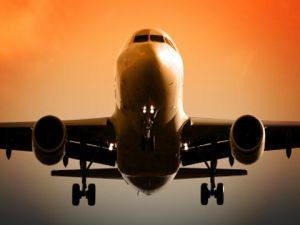
The use of plant-based fuels for flights, backed by the EU, could contribute to higher food prices and increased greenhouse gas emissions
Europe’s biggest airlines, including British Airways, Lufthansa and KLM have announced a major biofuels drive despite UN calls to limit biofuel growth.>
A glitzy gathering of the elite of Europe’s airline industry in Paris this week saw the launch of a major PR offensive to highlight the move towards replacing fossil fuels with biofuels- liquid fuels made from crops plants such as oil palm and jatropha.
The EU has set targets for 10 per cent of transport fuels to come from renewable sources – as part of that it is now pushing for the aviation sector to use two million tonnes of biofuel, mostly oil palm, each year by 2020.
However, environmental groups believe aviation’s demand for biofuels will increase the expansion of oil palm in the tropics, leading to destruction of rainforest in countries like Indonesia and Cameroon. While the UN says paying for the production of crops like oil palm or jatropha for biofuels removes the availability of land for food crops and puts increasing pressure on food prices.
Biofuel production will need to increase dramatically to meet the two million tonnes target, which is the equivalent of filling the petrol tanks of 40 million cars. Campaigners say an area the size of Belgium will be needed to grow enough plants to meet this demand.
Airlines PR offensive
At the Paris Air Show this week, European airlines Air France-KLM, Lufthansa, BA and the aircraft manufacturer Airbus announced plans to increase their use of biofuels.
Air France-KLM say they will be operating more than 200 biofuel-powered flights by September, using a mix of biofuel and conventional fossil fuels. While British Airways are planning to build a biofuel production plant to ‘encourage others to follow our lead’.
So far aviation industry leaders have been careful to promote the importance of sustainable biofuels and claim to be sourcing plants from within Europe.
However, Swedish biofuels giant Neste Oil, who are one of the companies who plan to supply airlines with biofuels, use a combination of plants that is 80 per cent oil palm – predominantly grown in Malaysia and Indonesia and linked to the continued loss of tropical rainforest in those countries.
In addition, Lufthansa, which is running a six-month biofuel trial, says it is planning to use jatropha oil. But as the Ecologist reported in April, a report by by the charity ActionAid found the development of jatropha plantations would prodce 2.5 to six times more greenhouse gas emissions than fossil fuels.
Friends of the Earth biofuels campaigner Robbie Blake says airlines such as BA are using the switch to renewable fuels and the associated publicity as a ‘smokescreen’ allowing it to avoid making the genuine emission reductions needed.
‘Palm oil and jatropha are currently part of the mix – they’re in the Commission’s and Lufthansa’s future plans. They definitely don’t come from Europe, but they do come with a lot of excess baggage – environmental and social devastation,’ he says.
As well as the environmental impact, the UN warned earlier this month that biofuel production was making food prices increasingly volatile – hitting poor families in less industrialised countries. It called on regulators, like the EU, to stop promoting biofuels and remove subsidies that support growing plants for fuel in place of food crops.

